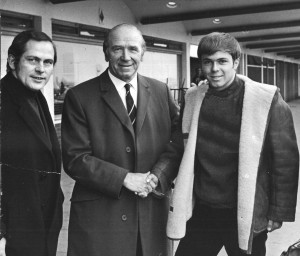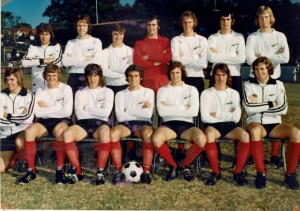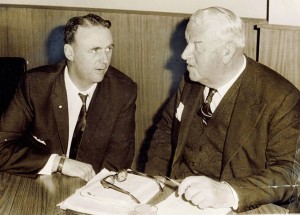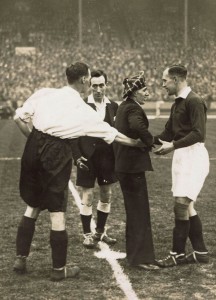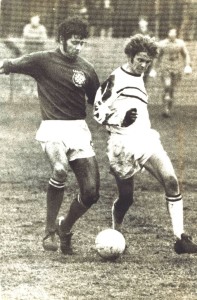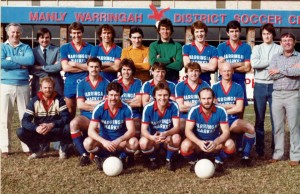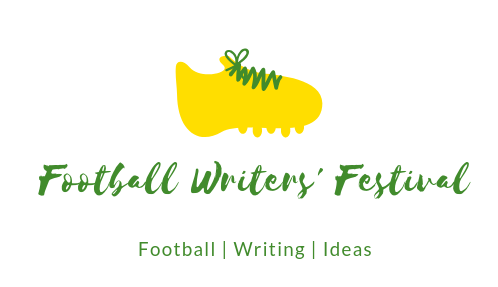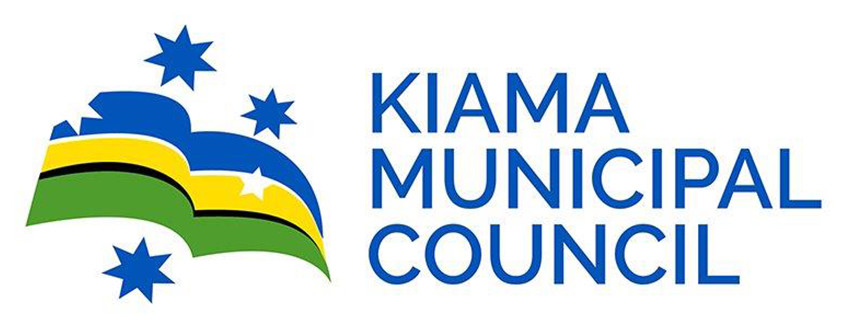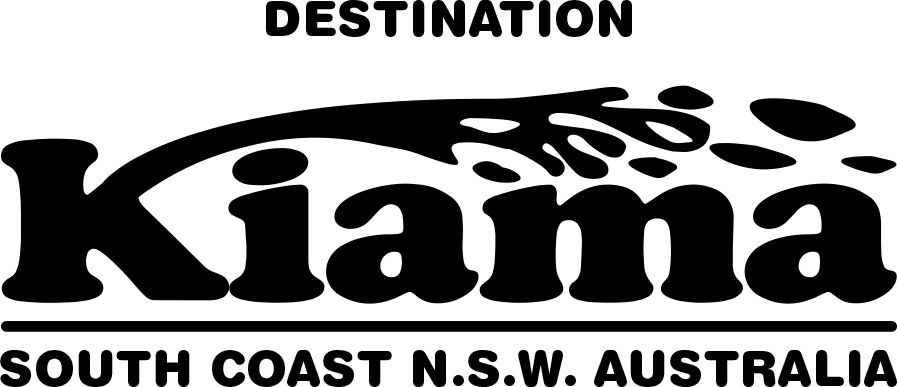For the average football supporter, it’s almost impossible to understand what it’s like to walk in the shoes of David Jack, the former Western Suburbs, Apia and Manly State League flanker.
His football heritage dates back four generations to his famous great grandfather, Bob Jack, who managed Plymouth Argyle for twenty eight seasons from 1910-1938, after completing a successful fifteen year playing career with Bolton Wanderers, Preston, Plymouth and Southend
Perhaps, the shining light in the Jack football dynasty was his grandfather, the famous England striker and captain, David Bone Nightingale Jack, who amassed 267 goals in 521 appearances for Plymouth, Bolton Wanderers and Arsenal from 1919 – 1934.
In 1967, David Jack Junior began the voyage of a lifetime when his father, David and family, migrated to Australia to continue his journalistic career which lasted for twenty years on the Sydney Sun before he retired.
Very few people would be aware that David Jack Senior was a prolific biographer and was the first person to write the Sir Matt Busby story and also included in his collection, the football lives of Tom Finney, Jimmy McIlroy and Len Shackleton.
David Jack Junior had his chance to make a name in English football when he returned to Manchester in 1970 to trial at Old Trafford.
However, he chose to return to Australia to pursue other career opportunities while playing semi-professional football in the NSW State League for many years.
In this interview with Roger Sleeman, David Jack Junior tells the story of his famous football family.
ROGER SLEEMAN
You come from a famous football family going back three generations.
What is the feeling having such a wonderful football heritage?
DAVID JACK
It certainly makes me proud and when I researched, I found out how good a player my great grandfather, Bob, was.
He was one of the first Scotsmen to come to England when he signed with Preston North End in the 1890’s and he was part of the” Invincibles” who won the League and Cup double which was not achieved for a long time after.
Unfortunately, I didn’t get to know my grandfather, David Bone Nightingale Jack, who captained Arsenal and England.
My father, David, was also a decent player but ironically his father advised him to get a proper job, although he would’ve made a reliable 3rd Division centre half.
He said to my father, if you get injured you’ll only get a couple of pounds a week so he took up writing.
As a player, I realised I couldn’t emulate my great grandfather or grandfather’s deeds, especially when my father showed me letters he had received describing how great a player my grandfather was.
One letter related to his combination with the legendary Charles Buchan at Arsenal, saying he was so stylish, he resembled an aristocrat on the football field.
Arsenal paid a record transfer fee for him when he signed for them in 1928.
R.S.
Can you outline in more detail the background of your great grandfather, Bob Jack?
D.J.
Bob came from Alloa Athletic in 1895 to Bolton Wanderers and he was top scorer in the 2nd year before he moved to Preston for two seasons.
In 1903, he moved to Plymouth Argyle followed by a stint at Southend and eventually returned to Plymouth to take up the managerial position which he held for a record breaking twenty eight years. When he passed away in 1943 they scattered his ashes over the pitch.
Not surprisingly, they still talk about him today as the legendary manager.
R.S.
Your grandfather had a prolific goalscoring record.
Can you tell us more about him?
D.J.
He was very quick with a good turn of speed and great skill. He knew where the goal was and seemed to save it for the big occasion like the Cup Final at Wembley in 1926 when Bolton won 1-0. In 1930 he won the Cup again with Arsenal but lost the 1932 final with a contentious decision against Newcastle.
It wasn’t until the 1980’s that Mark Hughes matched the four Cup Finals of my grandad.
He played nine times for England and scored three goals, captaining them twice.
R.S
Could you retrace your father’s wonderful career in football journalism in Australia and the UK?
D.J.
Since 1950, he’d been a journalist in the UK in a number of sports, influenced by his father who’d been a correspondent during the war.
Based in London, he was moved north to Manchester and was lucky he wasn’t on the plane during the Munich air tragedy.
He covered the first round when Manchester United played against Shelbourne in Dublin and was fortunate to be sent by his sporting editor to the World Cup draw in Sweden, rather than going to cover the match in Munich.
He continued to write for papers just outside Manchester and became Chairman of the Football Writers Association in 1966 for one year and was privileged to present to Bobby Charlton the award for the footballer of the year.
In 1967, we came to Australia to get the sunshine and my father eventually got a job with the Sydney Sun where he remained for twenty years.
It took some time to acclimatize because he was used to England where football coverage was unlimited whilst here he had to fight for ten or twelve paragraphs.
Jim Bayutti and Sir Arthur George, the former Australian Soccer Federation officials, threatened to sue him a few times but he still enjoyed it before he moved down the South Coast and died young at 64 years age in Sussex Inlet.
R.S.
You were always a Manchester United supporter.
Can you explain what it really means?
D.J.
Funnily, I never had a connection with Alloa, Bolton, Preston, Bolton or Plymouth but moving to Manchester when I was four, my boyhood was spent going to Old Trafford with my father who would stick me under his overcoat in the press box.
At ten or eleven I would go on my own and in 1963, when United won the Cup, it was a high point for me.
When George Best arrived in late 1963, I happened to be at Old Trafford when he scored his first goal against Burnley in a 5-1 win after they had been beaten 6-1 on Christmas Eve at Turf Moor.
R.S.
You trialled at Manchester United in 1970.
Tell us about the experience?
D.J.
Originally, I didn’t want to come to Australia but fortunately my father was a good friend of Sir Matt Busby so the club paid my fare and I arrived in Manchester in mid November and started training with the B team, although I hadn’t played since mid-September.
There were players in the A and B teams like Sammy McIlroy and Jimmy Greenhoff and I scored a couple of goals which was very pleasing considering my lack of game time.
It was very physical and competitive but I was on my own and I could’ve stayed and been selected in the youth team but as to being in the first team, that was another story.
Frankly, I didn’t have the drive of a Craig Johnston or Tim Cahill to make it and the money wasn’t great then.
R.S.
You trained with George Best in that three month trial period.
Please explain how great this man was.
D.J.
It was pretty hard training and in the 10-12 p.m. period we’d be in the big indoor gym playing five a side which would become fifteen a side.
When you had George on your side, you saw he had everything including incredible balance and you couldn’t catch him in the first fifteen yards.
He was also very two footed and could change direction at will.
I’ve seen Pele and Maradona play live but for pure entertainment value, Best was a marvel.
I trained with him for the first six weeks and then he went missing at the time Wilf McGuiness got the sack and Busby came back as manager.
Some people assumed he was big headed but he was shy and modest, considering the press attention.
Bobby Charlton was a star but when Denis Law came along, followed by Best, he lost some of the limelight. I believe Charlton was a little jealous of Best due to the unwavering attention the Irishman received.
R.S.
Can you recap your Australian football career?
D.J.
I arrived in Sydney during March 1967 and went down to Dee Why Oval, the home of Dee Why who played in State League Division 2. I was told I was too good for them so they advised me to go to Graham Reserve where Manly was coached by the Hungarian coach, Denis Adrigan who had so much influence on the” Canterbury Babes”, John Warren, John Watkins and Brian Smith.
I was selected in the under 14 rep. team and half way through the next year in under 15 reps, I was spotted by Gordon Nutt who took me to Manly to play third grade at the age of fifteen.
Before I went to Old Trafford, I played in 1st grade at the age of sixteen. On my return I joined Western Suburbs and played my first game in first grade at Olympic Park in the Inter City Cup against Melbourne Croatia where I witnessed the incredible skills of Billy Vojtek.
I played regular first team football that season on the wing with the likes of Ross Kelly, Terry Eaton, Greg Byles, John Hargreaves, John Bjikerk, Peter Pont, Archie Blue, Brian Turner, Greg Smyth and scored eight goals in ten games under coach, Tommy Dawson.
In the early part of the 1973 season under coach Mike Laing, I was experiencing my best year at Wests before I tore two cartilages in my left knee which put me out for most of the season.
In 1974 I recovered and played in the reserve team before I had another knee injury.
I played with Apia in 1977 and 78 before they entered the NSL, with stars Terry Butler, John Doyle, Dave McQuire, Willie Wallace, coached by Phil Bottalico and scored a few goals.
In 1979, I joined Manly where the former Stoke City and Sydney City Terry Smith striker played next to me and I was placed 4th in the Rothmans medal that year.
I stayed four years with Manly and played a couple of seasons with Warringah Saints before moving to local Premier League outfit Brookvale, coached by legendary international, Joe Alagich.
We won the Champion of Champions under Joe.
I’m still playing over 35 football today at the ripe old age of 65.

